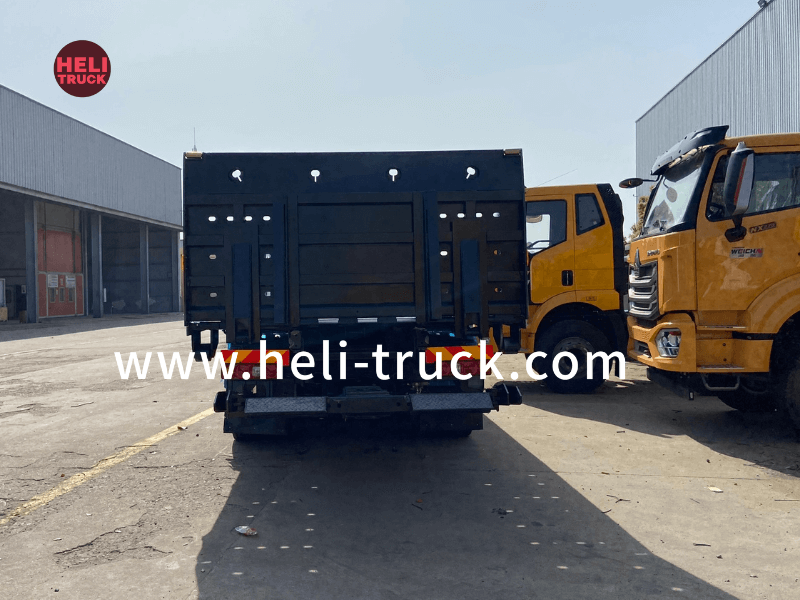Introduction
Construction sites are essential hubs for building our cities, homes, and infrastructure. However, with the construction process comes a significant amount of waste generation, ranging from debris, scraps, packaging materials, and more. Managing this waste efficiently is crucial not only for environmental sustainability but also for maintaining a safe and organized work environment. In this article, we will delve into the world of garbage compactor trucks and how they play a vital role in waste management on construction sites. We will explore the features, benefits, and best practices associated with these specialized vehicles that are designed to streamline waste collection and disposal processes.
Understanding Garbage Compactor Trucks
Garbage compactor trucks, also known as compactors or trash compactors, are specialized vehicles equipped with compacting mechanisms that compress waste materials to reduce their volume. These trucks are commonly used in various industries, including construction, waste management, and municipal services, to collect and transport solid waste efficiently. The primary function of garbage compactor trucks is to minimize the space occupied by waste, thereby reducing the frequency of trips required for disposal and optimizing the overall waste management process.
Types of Garbage Compactor Trucks
There are several types of garbage compactor trucks available, each designed to cater to specific needs and requirements. The two primary categories of garbage compactor trucks commonly used on construction sites are:
1. Rear Loader Compactor Trucks: Rear loader compactor trucks are equipped with a hydraulic compactor mechanism at the rear of the vehicle. Workers load waste into the truck through a rear hopper, and the compactor mechanism compresses the waste to create more space for additional materials. These trucks are suitable for collecting and compacting bulky waste items such as construction debris, wood, and metal scraps.
2. Front Loader Compactor Trucks: Front loader compactor trucks feature a hydraulic compactor mechanism at the front of the vehicle, typically located beneath the cab. These trucks are designed for collecting waste from large containers or dumpsters commonly found on construction sites. The front loader mechanism lifts and empties the containers into the compactor, where the waste is compressed for efficient transportation and disposal.
Benefits of Garbage Compactor Trucks for Construction Sites
Garbage compactor trucks offer a wide range of benefits for construction sites looking to streamline their waste management processes. Some of the key advantages of using these specialized vehicles include:
1. Space Optimization: By compacting waste materials, garbage compactor trucks maximize the space available for waste storage within the vehicle. This reduces the frequency of trips required for waste disposal, leading to cost savings and improved operational efficiency.
2. Improved Hygiene and Safety: Efficient waste management is essential for maintaining a clean and safe work environment on construction sites. Garbage compactor trucks help contain and transport waste securely, reducing the risk of accidents, injuries, and environmental hazards associated with loose or scattered waste materials.
3. Environmental Sustainability: Proper waste disposal is crucial for minimizing the environmental impact of construction activities. Garbage compactor trucks facilitate the organized collection and disposal of waste, ensuring that recyclable materials are separated and disposed of responsibly.
4. Cost-Effectiveness: Investing in garbage compactor trucks can result in long-term cost savings for construction companies. By reducing the number of trips required for waste disposal and optimizing the use of available space, these vehicles help lower operational costs and improve overall budget management.
5. Regulatory Compliance: Construction sites are subject to various regulations and guidelines regarding waste management and disposal. Garbage compactor trucks enable construction companies to adhere to these regulations effectively by ensuring proper waste containment, transportation, and disposal practices.
Best Practices for Using Garbage Compactor Trucks on Construction Sites
To maximize the efficiency and effectiveness of garbage compactor trucks on construction sites, it is essential to follow best practices for their operation and maintenance. Some key considerations include:
1. Regular Maintenance: Garbage compactor trucks should undergo routine maintenance checks to ensure that all components, including the compactor mechanism, hydraulic systems, and safety features, are functioning correctly. Regular servicing and inspections help prevent breakdowns and ensure optimal performance.
2. Proper Training: Operators and maintenance personnel responsible for garbage compactor trucks should receive adequate training on vehicle operation, safety protocols, and maintenance procedures. Proper training reduces the risk of accidents, improves vehicle handling, and prolongs the lifespan of the equipment.

3. Waste Segregation: Implementing a waste segregation system on construction sites can enhance the efficiency of garbage compactor trucks. By separating recyclable materials, hazardous waste, and general waste at the source, construction companies can optimize waste collection and disposal processes, reducing environmental impact and promoting sustainability.
4. Monitoring and Reporting: Construction companies should establish monitoring systems to track the volume and types of waste generated on-site. Keeping detailed records of waste collection, compaction, and disposal activities helps identify trends, optimize resource allocation, and demonstrate compliance with regulatory requirements.
5. Collaboration with Waste Management Providers: Building partnerships with waste management providers and recycling facilities can further enhance the effectiveness of garbage compactor trucks on construction sites. By coordinating waste collection schedules, exploring recycling options, and adopting sustainable waste management practices, construction companies can contribute to a more eco-friendly and responsible construction industry.
Conclusion
Garbage compactor trucks play a crucial role in optimizing waste management processes on construction sites, offering a range of benefits such as space optimization, improved hygiene and safety, environmental sustainability, cost-effectiveness, and regulatory compliance. By investing in these specialized vehicles and following best practices for their operation and maintenance, construction companies can streamline waste collection and disposal operations, reduce environmental impact, and enhance overall efficiency. Embracing Water tank truck emergency response of garbage compactor trucks represents a proactive step towards sustainable construction practices and responsible waste management in the industry.
